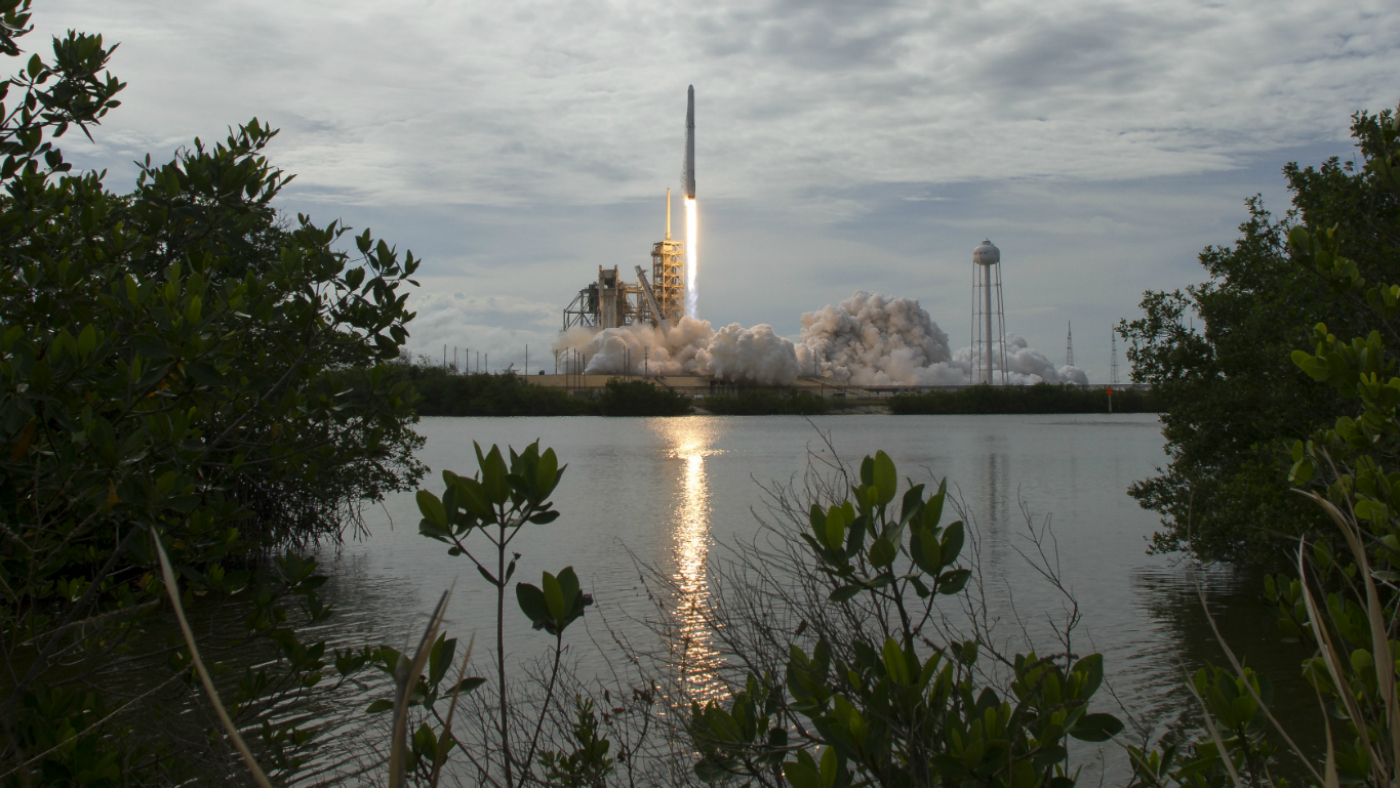SpaceX finally launches rocket on third attempt
Elon Musk announces successful deployment of Intelsat 35e satellite

A free daily email with the biggest news stories of the day – and the best features from TheWeek.com
You are now subscribed
Your newsletter sign-up was successful
SpaceX has finally launched its Intelsat 35e satellite into orbit after the mission was postponed on Monday following two failed attempts.
The Falcon 9 rocket left the Kennedy Space Centre in Florida yesterday, reports ArsTechnica, and successfully delivered the 14,905lb communications satellite "to geostationary transfer orbit".
Company founder Elon Musk tweeted that the satellite had been deployed at a height of 26,700 miles, significantly more than the minimum of 17,400 miles.
The Week
Escape your echo chamber. Get the facts behind the news, plus analysis from multiple perspectives.

Sign up for The Week's Free Newsletters
From our morning news briefing to a weekly Good News Newsletter, get the best of The Week delivered directly to your inbox.
From our morning news briefing to a weekly Good News Newsletter, get the best of The Week delivered directly to your inbox.
He also said SpaceX had "reviewed all systems" the evening before the launch to "ensure all is good".
These extra checks were conducted following two last-minute failed launch attempts on Sunday and Monday, the first of which was caused by "a guidance and navigation system glitch", reports CBS News.
While the fault was rectified for the next attempt, an "unrelated problem" led to the launch being aborted ten seconds before lift-off.
SpaceX has been pushing towards reusable booster rockets to cut down the servicing costs of space travel. However, TechCrunch says, this latest mission will "not include an attempt to recover the first stage" of the Falcon 9.
A free daily email with the biggest news stories of the day – and the best features from TheWeek.com
The Intelsat 35e satellite "is the heaviest payload SpaceX has ever launched toward geostationary orbit", says ArsTechnica, and "the rocket will not have enough fuel reserves to attempt a safe return to Earth".
It adds that the mission is "the company's third flight in 12 days and fourth in 32 days."
SpaceX relaunch 'no earlier than Wednesday'
4 July
SpaceX founder Elon Musk has announced that the company’s third attempt to send a satellite into space will take place "no earlier than Wednesday" after two failed launches in two days.
SpaceX was due to launch one of its Falcon 9 rockets, carrying the Intelsat 35e satellite, from the Kennedy Space Centre in Florida but the countdown was halted ten seconds before lift-off.
The company initially said it would try again on Tuesday, but Musk confirmed it would instead "spend [Tuesday] doing a full review of rocket and pad systems".
Neither SpaceX nor Musk revealed the cause of the second failure, but TechCrunch says it may have been the same "automated computer cut-off" that led to the first aborted launch on Sunday.
While there's no word on what sparked yesterday's computer cut-off, the website says Sunday's shutdown was triggered by "a reading that showed the rocket’s guidance system was off".
The rocket is expected to send the Intelsat 35e, a communications satellite, into orbit "36,000km [22,370 miles] above the Earth's surface", says ArsTechnica. Weighing 14,905lb (6,761kg), the satellite is the "heaviest payload SpaceX has ever launched to geostationary orbit".
However, while SpaceX has been able to recover the booster rockets from its previous missions, the site says this mission "will not have enough fuel reserves to attempt a safe return to Earth". Therefore, this booster "will be expended".
Meanwhile, Engadget says SpaceX successfully landed one of its Dragon capsules on Monday, which makes it "the first commercial spacecraft to re-fly to and from the International Space Station".
It's an "achievement" that bodes well for future space travel, as the site says reusing rockets "promises to dramatically lower the cost of each mission". This helps SpaceX "fly more often" and "accomplish missions without straining tight government budgets".
-
 How the FCC’s ‘equal time’ rule works
How the FCC’s ‘equal time’ rule worksIn the Spotlight The law is at the heart of the Colbert-CBS conflict
-
 What is the endgame in the DHS shutdown?
What is the endgame in the DHS shutdown?Today’s Big Question Democrats want to rein in ICE’s immigration crackdown
-
 ‘Poor time management isn’t just an inconvenience’
‘Poor time management isn’t just an inconvenience’Instant Opinion Opinion, comment and editorials of the day
-
 Are AI bots conspiring against us?
Are AI bots conspiring against us?Talking Point Moltbook, the AI social network where humans are banned, may be the tip of the iceberg
-
 Elon Musk’s pivot from Mars to the moon
Elon Musk’s pivot from Mars to the moonIn the Spotlight SpaceX shifts focus with IPO approaching
-
 Moltbook: the AI social media platform with no humans allowed
Moltbook: the AI social media platform with no humans allowedThe Explainer From ‘gripes’ about human programmers to creating new religions, the new AI-only network could bring us closer to the point of ‘singularity’
-
 Will regulators put a stop to Grok’s deepfake porn images of real people?
Will regulators put a stop to Grok’s deepfake porn images of real people?Today’s Big Question Users command AI chatbot to undress pictures of women and children
-
 Data centers could soon be orbiting in space
Data centers could soon be orbiting in spaceUnder the radar The AI revolution is going cosmic
-
 Inside a Black community’s fight against Elon Musk’s supercomputer
Inside a Black community’s fight against Elon Musk’s supercomputerUnder the radar Pollution from Colossal looms over a small Southern town, potentially exacerbating health concerns
-
 X update unveils foreign MAGA boosters
X update unveils foreign MAGA boostersSpeed Read The accounts were located in Russia and Nigeria, among other countries
-
 What's Linda Yaccarino's legacy? And what's next for X?
What's Linda Yaccarino's legacy? And what's next for X?Today's Big Question An 'uncertain future' in the age of TikTok